Docklands Academy: Managing Customer Experience Report - Unit 2
VerifiedAdded on 2023/01/16
|8
|1910
|98
Report
AI Summary
This report delves into the intricacies of managing customer experience within the hospitality sector, focusing on the application of digital technologies and customer relationship management (CRM) systems. It explores how businesses leverage these tools to enhance customer engagement, increase sales, and foster brand loyalty. The report analyzes various CRM systems, highlighting their strengths and weaknesses, and examines consumer service strategies like CEM and touch point analysis. These strategies are crucial for understanding and meeting customer needs, ultimately developing positive customer experiences. The report also references a real-world application of these concepts, the Docklands Academy's international food event, showcasing the practical implications of effective customer experience management. The document provides an in-depth understanding of digital technology in customer service, consumer strategies and its influence on consumer behavior in the hospitality sector. The report is a valuable resource for students seeking insights into the practical application of customer experience management within the hospitality sector. The report is contributed by a student to be published on the website Desklib. Desklib is a platform which provides all the necessary AI based study tools for students.
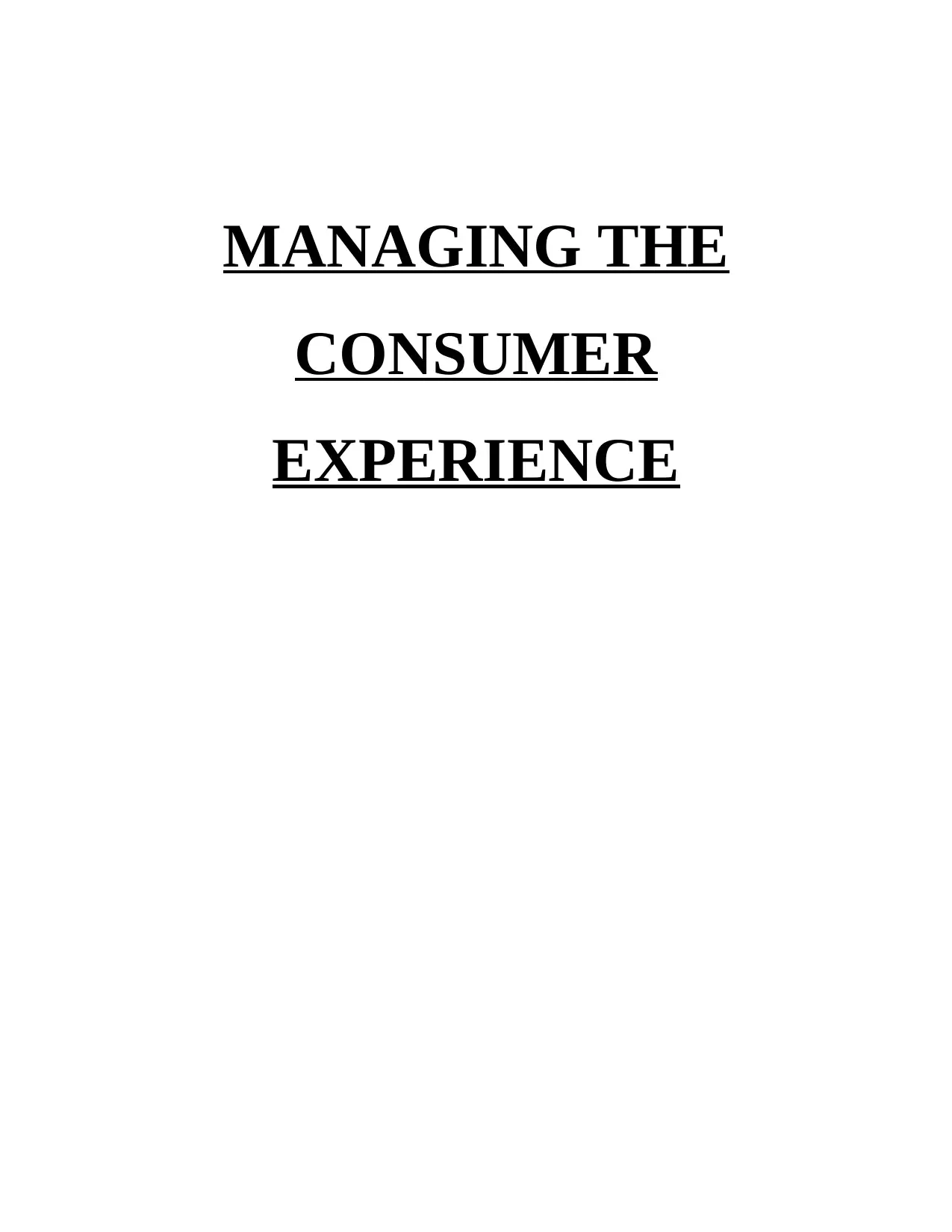
MANAGING THE
CONSUMER
EXPERIENCE
CONSUMER
EXPERIENCE
Paraphrase This Document
Need a fresh take? Get an instant paraphrase of this document with our AI Paraphraser
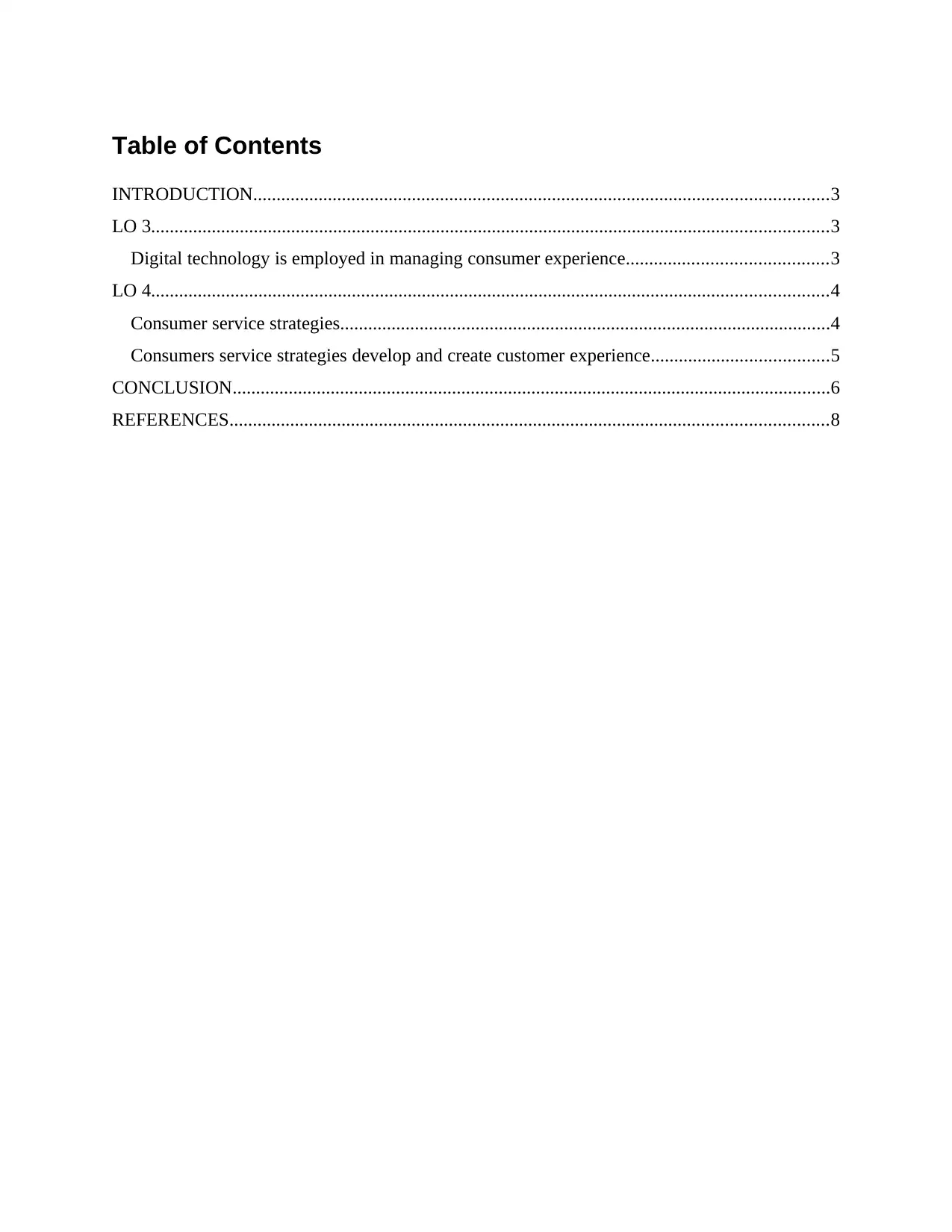
Table of Contents
INTRODUCTION...........................................................................................................................3
LO 3.................................................................................................................................................3
Digital technology is employed in managing consumer experience...........................................3
LO 4.................................................................................................................................................4
Consumer service strategies.........................................................................................................4
Consumers service strategies develop and create customer experience......................................5
CONCLUSION................................................................................................................................6
REFERENCES................................................................................................................................8
INTRODUCTION...........................................................................................................................3
LO 3.................................................................................................................................................3
Digital technology is employed in managing consumer experience...........................................3
LO 4.................................................................................................................................................4
Consumer service strategies.........................................................................................................4
Consumers service strategies develop and create customer experience......................................5
CONCLUSION................................................................................................................................6
REFERENCES................................................................................................................................8
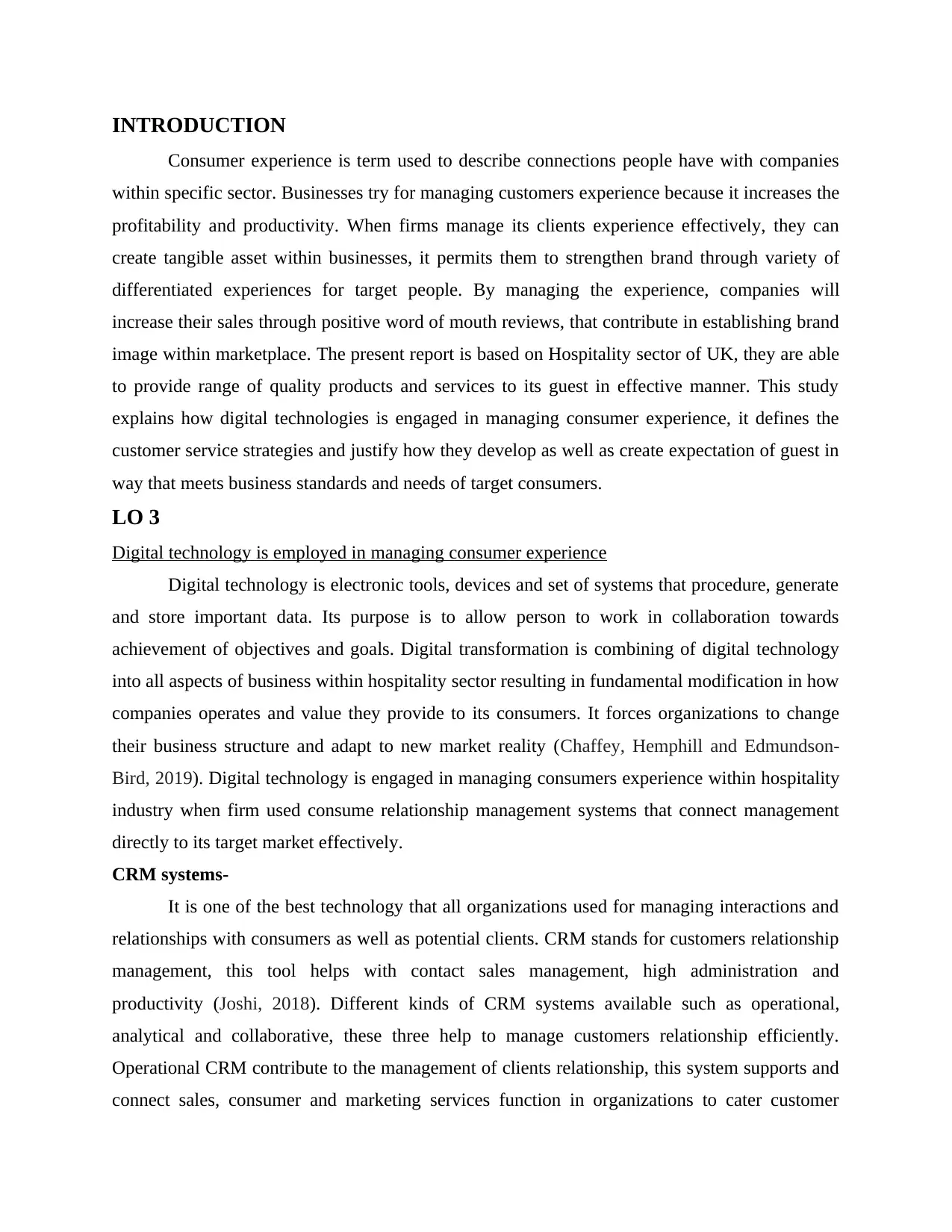
INTRODUCTION
Consumer experience is term used to describe connections people have with companies
within specific sector. Businesses try for managing customers experience because it increases the
profitability and productivity. When firms manage its clients experience effectively, they can
create tangible asset within businesses, it permits them to strengthen brand through variety of
differentiated experiences for target people. By managing the experience, companies will
increase their sales through positive word of mouth reviews, that contribute in establishing brand
image within marketplace. The present report is based on Hospitality sector of UK, they are able
to provide range of quality products and services to its guest in effective manner. This study
explains how digital technologies is engaged in managing consumer experience, it defines the
customer service strategies and justify how they develop as well as create expectation of guest in
way that meets business standards and needs of target consumers.
LO 3
Digital technology is employed in managing consumer experience
Digital technology is electronic tools, devices and set of systems that procedure, generate
and store important data. Its purpose is to allow person to work in collaboration towards
achievement of objectives and goals. Digital transformation is combining of digital technology
into all aspects of business within hospitality sector resulting in fundamental modification in how
companies operates and value they provide to its consumers. It forces organizations to change
their business structure and adapt to new market reality (Chaffey, Hemphill and Edmundson-
Bird, 2019). Digital technology is engaged in managing consumers experience within hospitality
industry when firm used consume relationship management systems that connect management
directly to its target market effectively.
CRM systems-
It is one of the best technology that all organizations used for managing interactions and
relationships with consumers as well as potential clients. CRM stands for customers relationship
management, this tool helps with contact sales management, high administration and
productivity (Joshi, 2018). Different kinds of CRM systems available such as operational,
analytical and collaborative, these three help to manage customers relationship efficiently.
Operational CRM contribute to the management of clients relationship, this system supports and
connect sales, consumer and marketing services function in organizations to cater customer
Consumer experience is term used to describe connections people have with companies
within specific sector. Businesses try for managing customers experience because it increases the
profitability and productivity. When firms manage its clients experience effectively, they can
create tangible asset within businesses, it permits them to strengthen brand through variety of
differentiated experiences for target people. By managing the experience, companies will
increase their sales through positive word of mouth reviews, that contribute in establishing brand
image within marketplace. The present report is based on Hospitality sector of UK, they are able
to provide range of quality products and services to its guest in effective manner. This study
explains how digital technologies is engaged in managing consumer experience, it defines the
customer service strategies and justify how they develop as well as create expectation of guest in
way that meets business standards and needs of target consumers.
LO 3
Digital technology is employed in managing consumer experience
Digital technology is electronic tools, devices and set of systems that procedure, generate
and store important data. Its purpose is to allow person to work in collaboration towards
achievement of objectives and goals. Digital transformation is combining of digital technology
into all aspects of business within hospitality sector resulting in fundamental modification in how
companies operates and value they provide to its consumers. It forces organizations to change
their business structure and adapt to new market reality (Chaffey, Hemphill and Edmundson-
Bird, 2019). Digital technology is engaged in managing consumers experience within hospitality
industry when firm used consume relationship management systems that connect management
directly to its target market effectively.
CRM systems-
It is one of the best technology that all organizations used for managing interactions and
relationships with consumers as well as potential clients. CRM stands for customers relationship
management, this tool helps with contact sales management, high administration and
productivity (Joshi, 2018). Different kinds of CRM systems available such as operational,
analytical and collaborative, these three help to manage customers relationship efficiently.
Operational CRM contribute to the management of clients relationship, this system supports and
connect sales, consumer and marketing services function in organizations to cater customer
⊘ This is a preview!⊘
Do you want full access?
Subscribe today to unlock all pages.

Trusted by 1+ million students worldwide
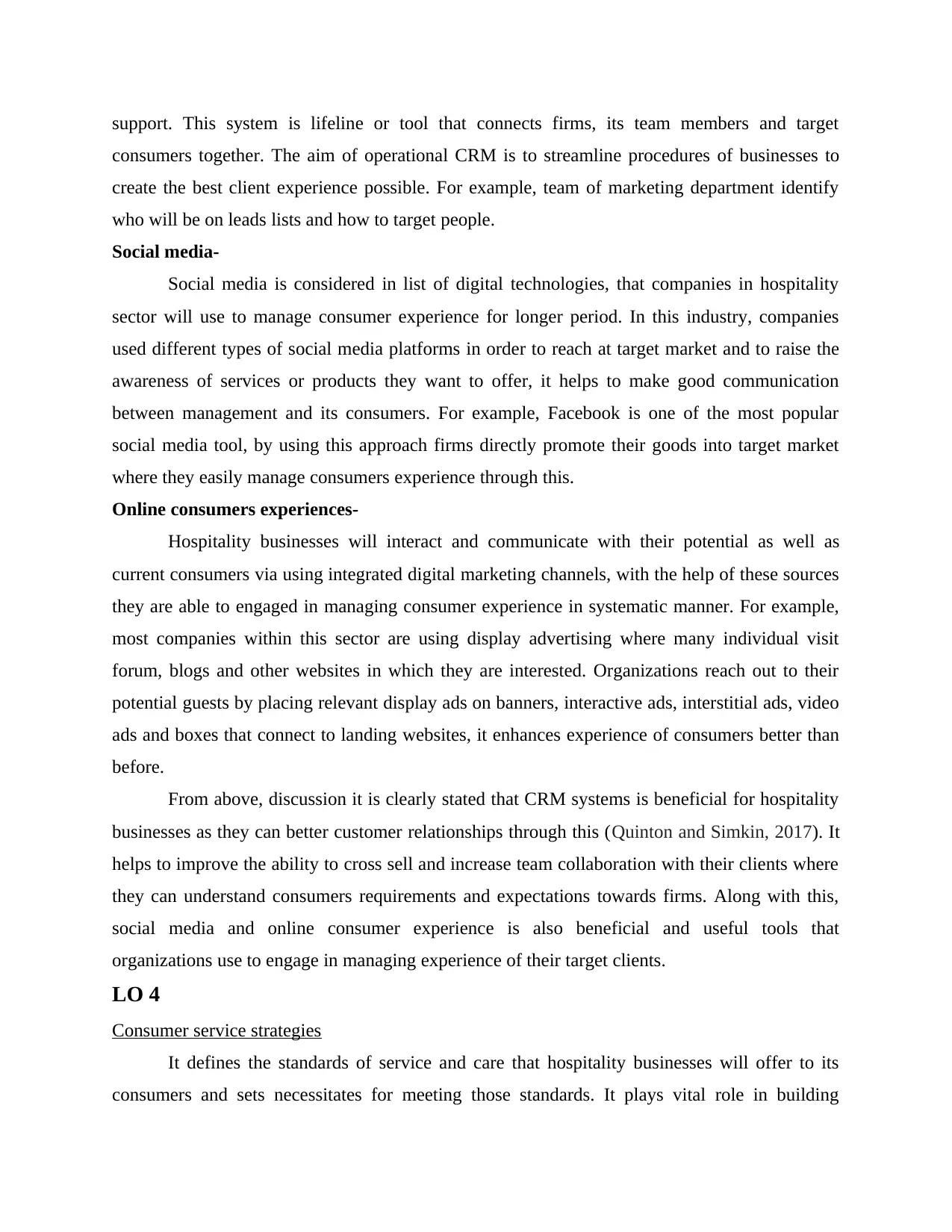
support. This system is lifeline or tool that connects firms, its team members and target
consumers together. The aim of operational CRM is to streamline procedures of businesses to
create the best client experience possible. For example, team of marketing department identify
who will be on leads lists and how to target people.
Social media-
Social media is considered in list of digital technologies, that companies in hospitality
sector will use to manage consumer experience for longer period. In this industry, companies
used different types of social media platforms in order to reach at target market and to raise the
awareness of services or products they want to offer, it helps to make good communication
between management and its consumers. For example, Facebook is one of the most popular
social media tool, by using this approach firms directly promote their goods into target market
where they easily manage consumers experience through this.
Online consumers experiences-
Hospitality businesses will interact and communicate with their potential as well as
current consumers via using integrated digital marketing channels, with the help of these sources
they are able to engaged in managing consumer experience in systematic manner. For example,
most companies within this sector are using display advertising where many individual visit
forum, blogs and other websites in which they are interested. Organizations reach out to their
potential guests by placing relevant display ads on banners, interactive ads, interstitial ads, video
ads and boxes that connect to landing websites, it enhances experience of consumers better than
before.
From above, discussion it is clearly stated that CRM systems is beneficial for hospitality
businesses as they can better customer relationships through this (Quinton and Simkin, 2017). It
helps to improve the ability to cross sell and increase team collaboration with their clients where
they can understand consumers requirements and expectations towards firms. Along with this,
social media and online consumer experience is also beneficial and useful tools that
organizations use to engage in managing experience of their target clients.
LO 4
Consumer service strategies
It defines the standards of service and care that hospitality businesses will offer to its
consumers and sets necessitates for meeting those standards. It plays vital role in building
consumers together. The aim of operational CRM is to streamline procedures of businesses to
create the best client experience possible. For example, team of marketing department identify
who will be on leads lists and how to target people.
Social media-
Social media is considered in list of digital technologies, that companies in hospitality
sector will use to manage consumer experience for longer period. In this industry, companies
used different types of social media platforms in order to reach at target market and to raise the
awareness of services or products they want to offer, it helps to make good communication
between management and its consumers. For example, Facebook is one of the most popular
social media tool, by using this approach firms directly promote their goods into target market
where they easily manage consumers experience through this.
Online consumers experiences-
Hospitality businesses will interact and communicate with their potential as well as
current consumers via using integrated digital marketing channels, with the help of these sources
they are able to engaged in managing consumer experience in systematic manner. For example,
most companies within this sector are using display advertising where many individual visit
forum, blogs and other websites in which they are interested. Organizations reach out to their
potential guests by placing relevant display ads on banners, interactive ads, interstitial ads, video
ads and boxes that connect to landing websites, it enhances experience of consumers better than
before.
From above, discussion it is clearly stated that CRM systems is beneficial for hospitality
businesses as they can better customer relationships through this (Quinton and Simkin, 2017). It
helps to improve the ability to cross sell and increase team collaboration with their clients where
they can understand consumers requirements and expectations towards firms. Along with this,
social media and online consumer experience is also beneficial and useful tools that
organizations use to engage in managing experience of their target clients.
LO 4
Consumer service strategies
It defines the standards of service and care that hospitality businesses will offer to its
consumers and sets necessitates for meeting those standards. It plays vital role in building
Paraphrase This Document
Need a fresh take? Get an instant paraphrase of this document with our AI Paraphraser
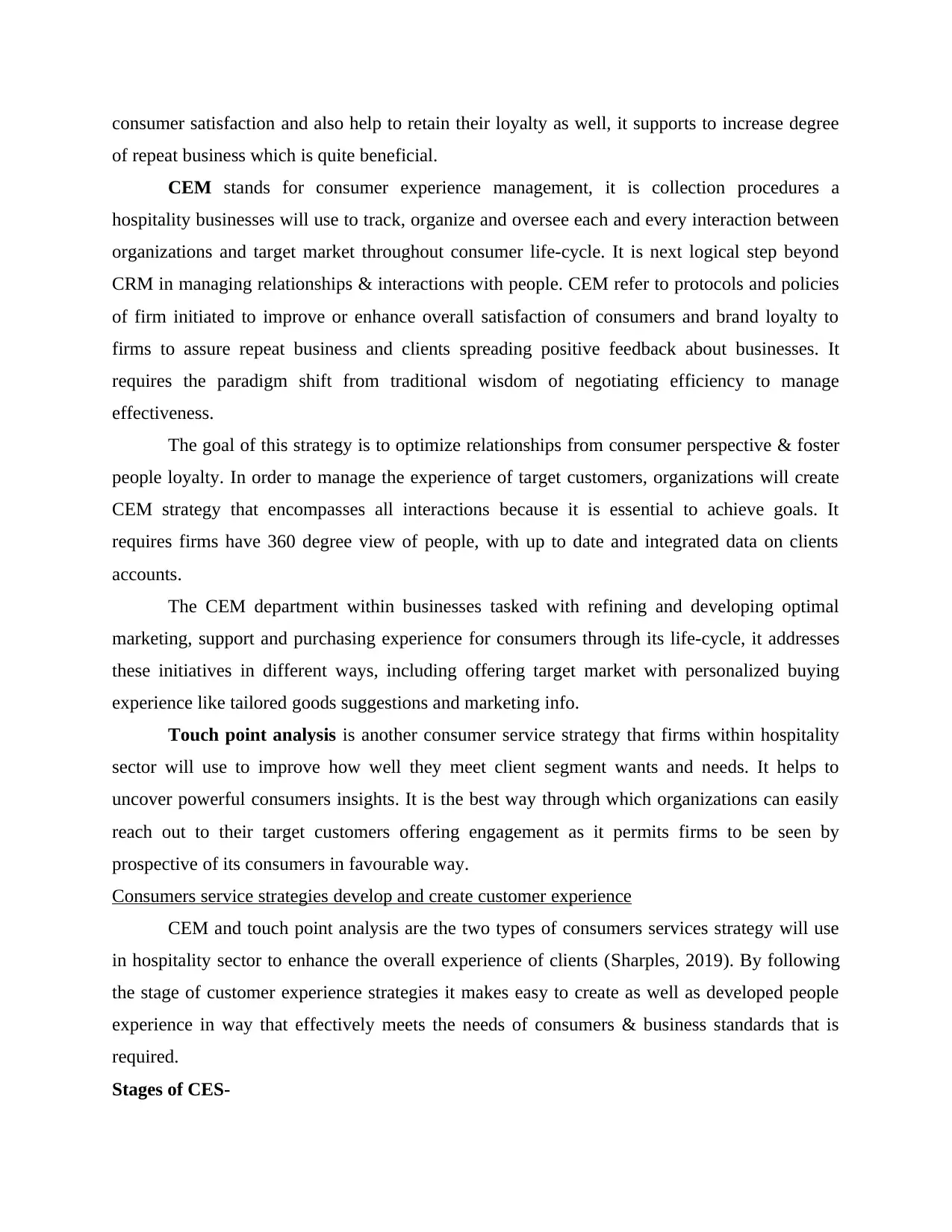
consumer satisfaction and also help to retain their loyalty as well, it supports to increase degree
of repeat business which is quite beneficial.
CEM stands for consumer experience management, it is collection procedures a
hospitality businesses will use to track, organize and oversee each and every interaction between
organizations and target market throughout consumer life-cycle. It is next logical step beyond
CRM in managing relationships & interactions with people. CEM refer to protocols and policies
of firm initiated to improve or enhance overall satisfaction of consumers and brand loyalty to
firms to assure repeat business and clients spreading positive feedback about businesses. It
requires the paradigm shift from traditional wisdom of negotiating efficiency to manage
effectiveness.
The goal of this strategy is to optimize relationships from consumer perspective & foster
people loyalty. In order to manage the experience of target customers, organizations will create
CEM strategy that encompasses all interactions because it is essential to achieve goals. It
requires firms have 360 degree view of people, with up to date and integrated data on clients
accounts.
The CEM department within businesses tasked with refining and developing optimal
marketing, support and purchasing experience for consumers through its life-cycle, it addresses
these initiatives in different ways, including offering target market with personalized buying
experience like tailored goods suggestions and marketing info.
Touch point analysis is another consumer service strategy that firms within hospitality
sector will use to improve how well they meet client segment wants and needs. It helps to
uncover powerful consumers insights. It is the best way through which organizations can easily
reach out to their target customers offering engagement as it permits firms to be seen by
prospective of its consumers in favourable way.
Consumers service strategies develop and create customer experience
CEM and touch point analysis are the two types of consumers services strategy will use
in hospitality sector to enhance the overall experience of clients (Sharples, 2019). By following
the stage of customer experience strategies it makes easy to create as well as developed people
experience in way that effectively meets the needs of consumers & business standards that is
required.
Stages of CES-
of repeat business which is quite beneficial.
CEM stands for consumer experience management, it is collection procedures a
hospitality businesses will use to track, organize and oversee each and every interaction between
organizations and target market throughout consumer life-cycle. It is next logical step beyond
CRM in managing relationships & interactions with people. CEM refer to protocols and policies
of firm initiated to improve or enhance overall satisfaction of consumers and brand loyalty to
firms to assure repeat business and clients spreading positive feedback about businesses. It
requires the paradigm shift from traditional wisdom of negotiating efficiency to manage
effectiveness.
The goal of this strategy is to optimize relationships from consumer perspective & foster
people loyalty. In order to manage the experience of target customers, organizations will create
CEM strategy that encompasses all interactions because it is essential to achieve goals. It
requires firms have 360 degree view of people, with up to date and integrated data on clients
accounts.
The CEM department within businesses tasked with refining and developing optimal
marketing, support and purchasing experience for consumers through its life-cycle, it addresses
these initiatives in different ways, including offering target market with personalized buying
experience like tailored goods suggestions and marketing info.
Touch point analysis is another consumer service strategy that firms within hospitality
sector will use to improve how well they meet client segment wants and needs. It helps to
uncover powerful consumers insights. It is the best way through which organizations can easily
reach out to their target customers offering engagement as it permits firms to be seen by
prospective of its consumers in favourable way.
Consumers service strategies develop and create customer experience
CEM and touch point analysis are the two types of consumers services strategy will use
in hospitality sector to enhance the overall experience of clients (Sharples, 2019). By following
the stage of customer experience strategies it makes easy to create as well as developed people
experience in way that effectively meets the needs of consumers & business standards that is
required.
Stages of CES-
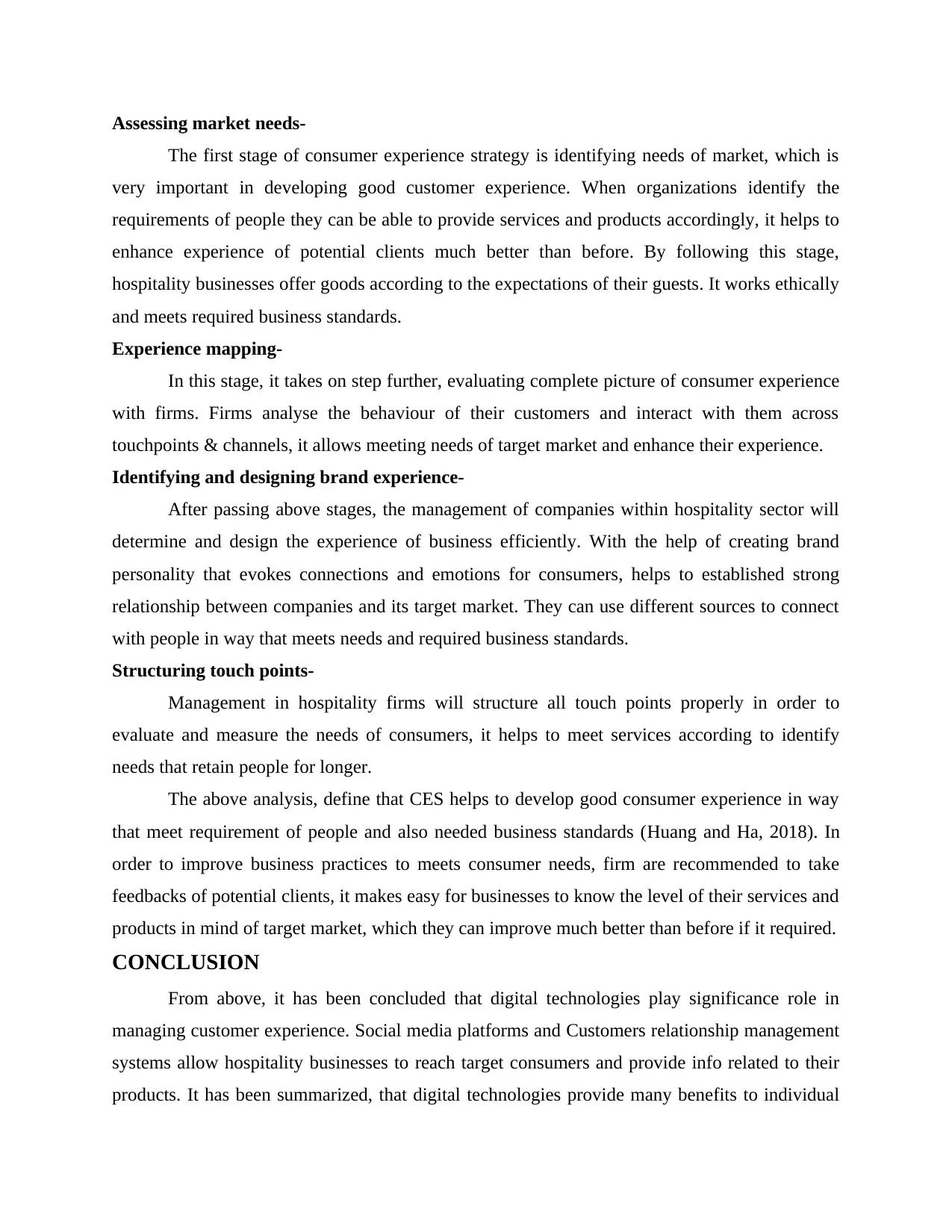
Assessing market needs-
The first stage of consumer experience strategy is identifying needs of market, which is
very important in developing good customer experience. When organizations identify the
requirements of people they can be able to provide services and products accordingly, it helps to
enhance experience of potential clients much better than before. By following this stage,
hospitality businesses offer goods according to the expectations of their guests. It works ethically
and meets required business standards.
Experience mapping-
In this stage, it takes on step further, evaluating complete picture of consumer experience
with firms. Firms analyse the behaviour of their customers and interact with them across
touchpoints & channels, it allows meeting needs of target market and enhance their experience.
Identifying and designing brand experience-
After passing above stages, the management of companies within hospitality sector will
determine and design the experience of business efficiently. With the help of creating brand
personality that evokes connections and emotions for consumers, helps to established strong
relationship between companies and its target market. They can use different sources to connect
with people in way that meets needs and required business standards.
Structuring touch points-
Management in hospitality firms will structure all touch points properly in order to
evaluate and measure the needs of consumers, it helps to meet services according to identify
needs that retain people for longer.
The above analysis, define that CES helps to develop good consumer experience in way
that meet requirement of people and also needed business standards (Huang and Ha, 2018). In
order to improve business practices to meets consumer needs, firm are recommended to take
feedbacks of potential clients, it makes easy for businesses to know the level of their services and
products in mind of target market, which they can improve much better than before if it required.
CONCLUSION
From above, it has been concluded that digital technologies play significance role in
managing customer experience. Social media platforms and Customers relationship management
systems allow hospitality businesses to reach target consumers and provide info related to their
products. It has been summarized, that digital technologies provide many benefits to individual
The first stage of consumer experience strategy is identifying needs of market, which is
very important in developing good customer experience. When organizations identify the
requirements of people they can be able to provide services and products accordingly, it helps to
enhance experience of potential clients much better than before. By following this stage,
hospitality businesses offer goods according to the expectations of their guests. It works ethically
and meets required business standards.
Experience mapping-
In this stage, it takes on step further, evaluating complete picture of consumer experience
with firms. Firms analyse the behaviour of their customers and interact with them across
touchpoints & channels, it allows meeting needs of target market and enhance their experience.
Identifying and designing brand experience-
After passing above stages, the management of companies within hospitality sector will
determine and design the experience of business efficiently. With the help of creating brand
personality that evokes connections and emotions for consumers, helps to established strong
relationship between companies and its target market. They can use different sources to connect
with people in way that meets needs and required business standards.
Structuring touch points-
Management in hospitality firms will structure all touch points properly in order to
evaluate and measure the needs of consumers, it helps to meet services according to identify
needs that retain people for longer.
The above analysis, define that CES helps to develop good consumer experience in way
that meet requirement of people and also needed business standards (Huang and Ha, 2018). In
order to improve business practices to meets consumer needs, firm are recommended to take
feedbacks of potential clients, it makes easy for businesses to know the level of their services and
products in mind of target market, which they can improve much better than before if it required.
CONCLUSION
From above, it has been concluded that digital technologies play significance role in
managing customer experience. Social media platforms and Customers relationship management
systems allow hospitality businesses to reach target consumers and provide info related to their
products. It has been summarized, that digital technologies provide many benefits to individual
⊘ This is a preview!⊘
Do you want full access?
Subscribe today to unlock all pages.

Trusted by 1+ million students worldwide
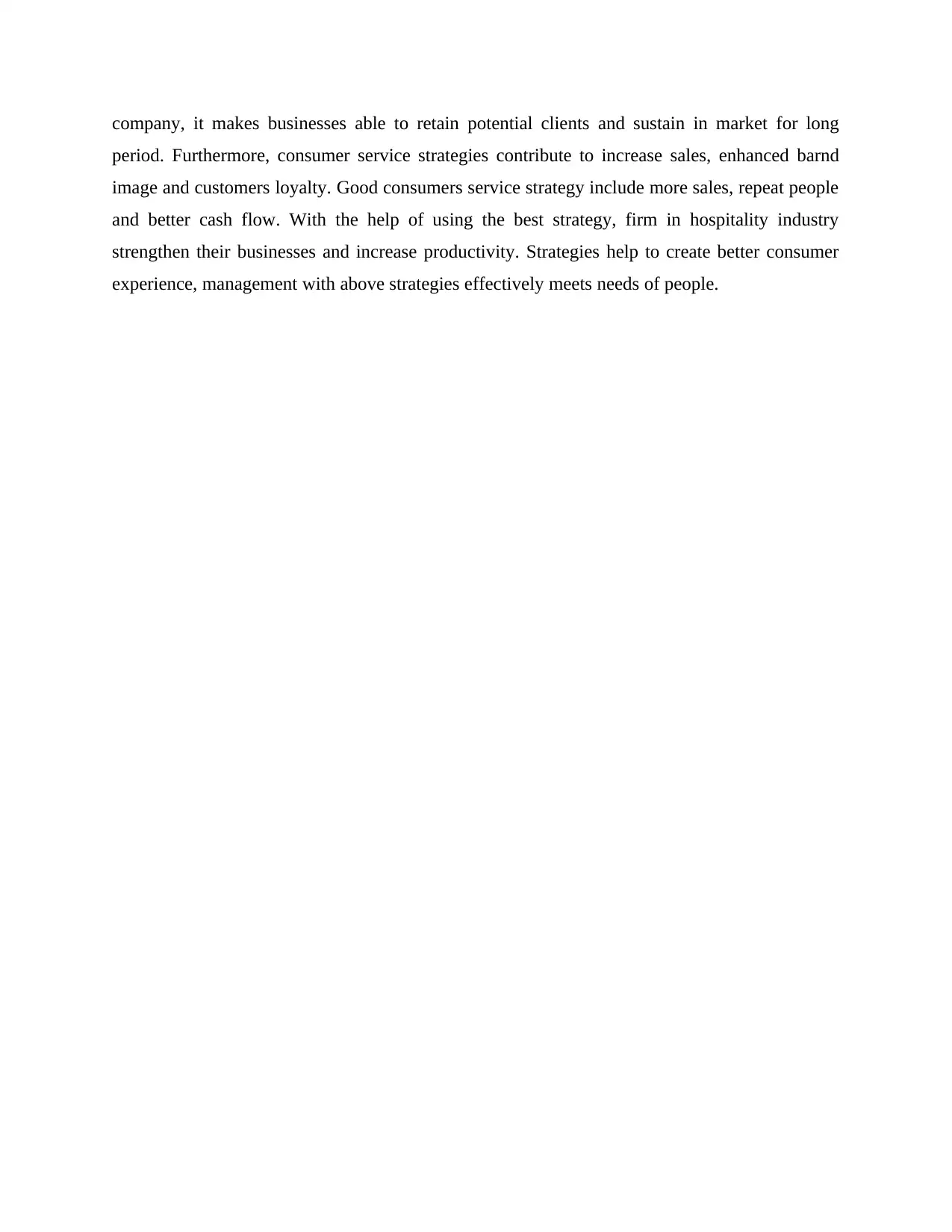
company, it makes businesses able to retain potential clients and sustain in market for long
period. Furthermore, consumer service strategies contribute to increase sales, enhanced barnd
image and customers loyalty. Good consumers service strategy include more sales, repeat people
and better cash flow. With the help of using the best strategy, firm in hospitality industry
strengthen their businesses and increase productivity. Strategies help to create better consumer
experience, management with above strategies effectively meets needs of people.
period. Furthermore, consumer service strategies contribute to increase sales, enhanced barnd
image and customers loyalty. Good consumers service strategy include more sales, repeat people
and better cash flow. With the help of using the best strategy, firm in hospitality industry
strengthen their businesses and increase productivity. Strategies help to create better consumer
experience, management with above strategies effectively meets needs of people.
Paraphrase This Document
Need a fresh take? Get an instant paraphrase of this document with our AI Paraphraser
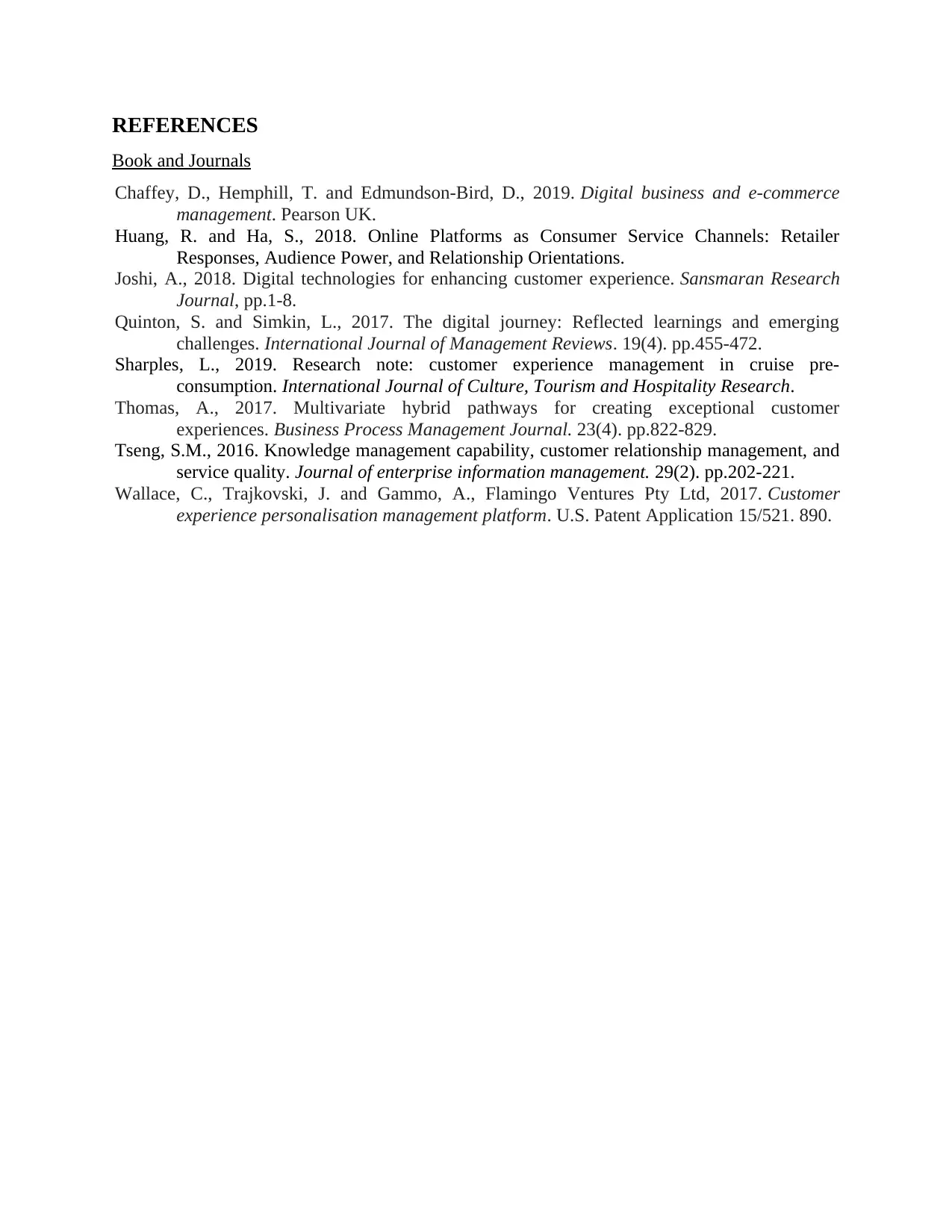
REFERENCES
Book and Journals
Chaffey, D., Hemphill, T. and Edmundson-Bird, D., 2019. Digital business and e-commerce
management. Pearson UK.
Huang, R. and Ha, S., 2018. Online Platforms as Consumer Service Channels: Retailer
Responses, Audience Power, and Relationship Orientations.
Joshi, A., 2018. Digital technologies for enhancing customer experience. Sansmaran Research
Journal, pp.1-8.
Quinton, S. and Simkin, L., 2017. The digital journey: Reflected learnings and emerging
challenges. International Journal of Management Reviews. 19(4). pp.455-472.
Sharples, L., 2019. Research note: customer experience management in cruise pre-
consumption. International Journal of Culture, Tourism and Hospitality Research.
Thomas, A., 2017. Multivariate hybrid pathways for creating exceptional customer
experiences. Business Process Management Journal. 23(4). pp.822-829.
Tseng, S.M., 2016. Knowledge management capability, customer relationship management, and
service quality. Journal of enterprise information management. 29(2). pp.202-221.
Wallace, C., Trajkovski, J. and Gammo, A., Flamingo Ventures Pty Ltd, 2017. Customer
experience personalisation management platform. U.S. Patent Application 15/521. 890.
Book and Journals
Chaffey, D., Hemphill, T. and Edmundson-Bird, D., 2019. Digital business and e-commerce
management. Pearson UK.
Huang, R. and Ha, S., 2018. Online Platforms as Consumer Service Channels: Retailer
Responses, Audience Power, and Relationship Orientations.
Joshi, A., 2018. Digital technologies for enhancing customer experience. Sansmaran Research
Journal, pp.1-8.
Quinton, S. and Simkin, L., 2017. The digital journey: Reflected learnings and emerging
challenges. International Journal of Management Reviews. 19(4). pp.455-472.
Sharples, L., 2019. Research note: customer experience management in cruise pre-
consumption. International Journal of Culture, Tourism and Hospitality Research.
Thomas, A., 2017. Multivariate hybrid pathways for creating exceptional customer
experiences. Business Process Management Journal. 23(4). pp.822-829.
Tseng, S.M., 2016. Knowledge management capability, customer relationship management, and
service quality. Journal of enterprise information management. 29(2). pp.202-221.
Wallace, C., Trajkovski, J. and Gammo, A., Flamingo Ventures Pty Ltd, 2017. Customer
experience personalisation management platform. U.S. Patent Application 15/521. 890.
1 out of 8
Related Documents
Your All-in-One AI-Powered Toolkit for Academic Success.
+13062052269
info@desklib.com
Available 24*7 on WhatsApp / Email
![[object Object]](/_next/static/media/star-bottom.7253800d.svg)
Unlock your academic potential
Copyright © 2020–2026 A2Z Services. All Rights Reserved. Developed and managed by ZUCOL.





